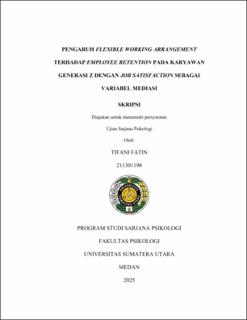Pengaruh Flexible Working Arrangement terhadap Employee Retention pada Generasi Z dengan Job Satisfaction sebagai Variabel Mediasi
The Effect of Flexible Working Arrangement on Employee Retention in Generation Z Employees with Job Satisfaction as a Mediating Variable
Abstract
Generation Z as a digital native generation has unique characteristics in the world of
work, including a high preference for flexibility and work-life balance. This study
aims to determine the effect of flexible working arrangements on employee retention
in Generation Z employees, with job satisfaction as a mediating variable. The method
used is a quantitative approach with a survey design and purposive sampling
technique, involving 395 Generation Z respondents aged 19-26 years who work in
organizations with flexible work policiesThe research instrument was a Likert scale
for each variable, and data analysis was conducted using simple regression test and
path analysis. The results show that flexible working arrangements have a positive
and significant effect on employee retention, both directly and indirectly. Job
satisfaction is shown to partially mediate the relationship between flexible working
arrangements and employee retention. These findings reinforce the important role of
work flexibility in improving job satisfaction of young employees, and provide
practical reference for organizations in developing work policies that are adaptive to
Generation Z values.
Collections
- Undergraduate Theses [1451]

